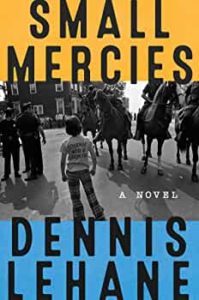 Dennis Lehane writes like an angel. His prose, while not flashy, is still beautiful, even while he writes about racial hatred, drug addiction, beat downs and murders. Through his compelling way of creating character, he reaches in and gives your heart a squeeze, and I think he writes better than anyone about the highways of grief, loss and heartbreak. It’s one of those miracles of empathy that only the most powerful of writers possess.
Dennis Lehane writes like an angel. His prose, while not flashy, is still beautiful, even while he writes about racial hatred, drug addiction, beat downs and murders. Through his compelling way of creating character, he reaches in and gives your heart a squeeze, and I think he writes better than anyone about the highways of grief, loss and heartbreak. It’s one of those miracles of empathy that only the most powerful of writers possess.
While this story is a simple one, in one way, it’s also full of complicated layers and wrong turns. It’s very basically the story of a worried mother looking for her missing daughter. The mother, the tough as nails Mary Pat Fennessy, lives in South Boston in 1974, just as school busing is about to break the city into riots and protests. The kids from Southie will be bussed into the black area of Roxbury, and vice versa. Mary Pat’s 17 year old daughter, Jules, is scheduled to be on the first bus.
Mary Pat, separated from her husband, scrapes a living and exists in a grim public housing apartment, but as the book makes clear, this neighborhood is all she’s ever known. She says good bye to Jules as she heads off on a date with her boyfriend, a stoner named Rum, and wakes up the next morning to discover that Jules has not returned.
While at work, Mary Pat is distracted, but not yet full on worried. One of her co-workers, a black woman nicknamed Dreamy, hasn’t turned up, and late in the day Mary Pat realizes that the young black man who fell to his death in front of a subway train must be Dreamy’s son. She’s lost a son herself, and while she wasn’t close to the woman, feels her loss. But as one day of her daughter’s disappearance turns into two and then three, her worry increases and she’s on a mission to find out what happened.
Lehane writes brutally about the racism that permeated South Boston. The idea that a young black man was in a white Southie subway station is a microcosm of that racism, a death that does in fact turn out to be what we would today recognize as a hate crime. The hatreds and polarization Lehane writes about in 1974 Boston seem still very sadly familiar today.
As Mary Pat digs into her daughter’s disappearance, the story reveals the layers of the way the neighborhood is run by a mob and the man who runs the mob is untouchable. It has a real feel of Scorcese’s film The Departed (or maybe The Departed has the feel of a Dennis Lehane novel). But Mary Pat is an avenging, and fearless, death angel who has nothing to lose and fears no mob boss.
The violence that concludes this novel, as in any Lehane novel, is operatic. It suits the scope and scale of his storytelling which is both intimate and epic. The topic is epic; the intimate nature of one woman’s story of grief and loss and search for revenge and justice makes you connect with what’s happening. What could easily have been a polemic about racism and busing becomes instead a skillful dissection of both a certain place and a certain time, highlighted by Mary Pat’s very specific and relentless grief.
I can’t say this was a pleasant read, with its graphic depiction of drug abuse, racial hatred, grief and violence, but it was a read I could neither look away from or forget once I finished reading it. From a writer like Dennis Lehane, I expected nothing less. — Robin Agnew